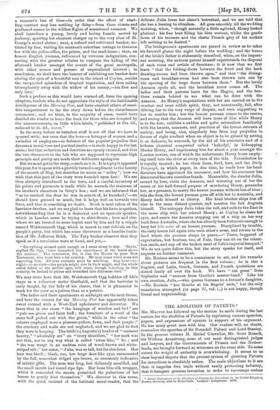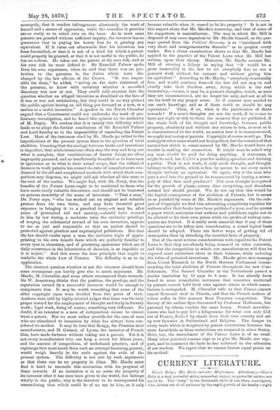THE ABOLITION OF PATENTS.*
MR. MACFIE has followed up the motion he made during the last session for the abolition of Patents by reprinting various speeches, papers, and expressions of opinion in support of his argument. He has many great men with him. Our readers will, no doubt, remember the speeches of Sir Bounden Palmer and Lord Stanley. In the present volume M. Michel Chevalier, Mr. Scott Russell, Sir William Armstrong, some of our most distinguished judges and lawyers, and the Governments of Prussia and the Nether- lands, are brought forward as witnesses on the same side. To some extent the weight of authority is overwhelming. It seems to us clear beyond dispute that the present system of granting Patents for inventions is absolutely rotten. The main objections to it are that it impedes free trade without really protecting industry, that it hampers genuine invention in order to encourage useless • Recent Discussions on the Abolition of Patents for Inventions in the United Kingdom, France, Germany, and the Netherlands. London: Longmans. 1869. monopoly, that it renders infringement alternately the work of hazard and a means of oppression, while the remedies it provides are so costly as to entail ruin on the loser. As in most cases patents are granted without sufficient inquiry, the inventor has no guarantee that in paying his heavy fees he is gaining any equivalent. If it tarns out afterwards that his invention has been forestalled, or that it is not of a kind for which a patent could properly be granted, or that it is not useful to the public, he has no redress. He takes out the patent, at his own risk, and at his own risk he must defend it. Sir Roundell Palmer spoke from his own experience, when he said that there was no pro- tection to the patentee in the duties which were dis- charged by the law officers of the Crown. "It was impos- sible for them," he added, "acting on the mere statement of the patentee, to know with certainty whether a so-called discovery was new or not. They could only examine into the question whether an alleged invention as described on the face of it was or was not satisfactory, but they could in no way protect the public against having an old thing put forward as a new, or a useless as a useful invention." A speaker in the Dutch Chamber argued that a Government could not undertake the work of pre- liminary investigation, and he based this opinion on the authority of M. Dupin. We confess that it is mainly this difficulty which leads us to adopt the further conclusions of Sir Roundell Palmer and Lord Stanley as to the impossibility of amending the Patent Law. Most of the instances cited by Mr. Macfie go rather to the imperfections of the present system than to the question of total abolition. Granting that the analogy between books and inventions is imperfect, that crude inventions often stop the way and keep out what is complete, that combinations of known things are often improperly patented, and so insufficiently described as to leave men in ignorance as to what is their actual scope, that the refusal of licences to work patents has caused the ruin of manufacturers con- demned to the old and complicated methods with which their com- petitors may dispense, we might still ask whether all this went to the root of the matter. We might feel, with Dr. Percy, that the benefits of the Patent Laws ought to be restricted to those who have made really valuable discoveries, and should not be bestowed on persons unworthy of the name of inventors. "That a man," Dr. Percy says, "who has worked out an original and valuable process from his own brain, and may have incurred great -expenses in bringing it to a practical issue,—it may be, after years of protracted toil and anxiety,—should have secured to him by law during a moderate term the exclusive privilege of reaping the substantial reward of his own invention, appears to me as just and reasonable as that an author should be protected against piratical and unprincipled publishers. But that the law should confer upon a man the exclusive right of appro- priating to his own benefit facts which are perfectly familiar to every tyro in chemistry, and of practising operations which are of daily occurrence in the laboratories of chemists, is as impolitic as it is unjust." And this seems the true principle that ought to underlie the whole Law of Patents. The difficulty is as to its application.
The abstract question whether or not the inventor should have some recompense can hardly give rise to much argument. Mr. Macfie, M. Chevalier, and some others recommend State rewards. Sir W. Armstrong thinks that the position, the prestige, and the reputation earned by a successful inventor would be enough to compensate him. It may be worth remarking that some of the -older copyright cases were decided from this point of view. Authors were told by highly salaried judges that fame was the only proper reward for the employment of thought and study in literary work ; legal work, being of course, something very different. No doubt, if an inventor is a man of independent means he cannot want a patent. But we must rather provide for the case of men who are stimulated to invention by what has always been con- sidered its mother. It may be true that Krupp, the Prussian steel manufacturer, and M. Guimet, of Lyons, the inventor of French blue, have made fortunes without taking out a patent. Yet it is snot every manufacturer who can keep a secret for fifteen years, and the amount of competition, of underhand practice, and of espionage that must result from such an attempt becoming general, would weigh heavily in the scale against the evils of the present system. The difficulty is not met by such arguments as that there eau be no property in ideas. Mr. Macfie must And it hard to reconcile this contention with his proposal of State rewards. If an invention is in no sense the property of its inventor after it has once been given to the world, but belongs wholly to the public, why is the inventor to be recompensed for surrendering that which could be of no use to him, as it only
became valuable when it ceased to be his property ? It is not in this respect alone that Mr. Macfie's reasoning, and that of some of his supporters, is unsatisfactory. The way in which Mr. Mill is disposed of may seem ingenious to Mr. Macfie himself, as the pas- sage quoted front the Political Economy is so "interlaced with very short and unargumentative dissents" as to perplex every reader. But a closer examination shows us that Mr. Macfie has applied to the practice of the Patent Laws what Mr. Mill has written upon their theory. Moreover, Mr. Macfie accuses Mr. Mill of uttering a fallacy in saying that "it would be a gross immorality in the law to set everybody free to use a person's work without his consent and without giving him an equivalent." According to Mr. Macfie, "everybody is naturally free, and would continue free—if the law did not step in and cruelly take their freedom away, doing which is the real immorality,—to use, it may be, a person's thoughts, which, as soon they are communicated, are no longer his only, and not at all to use his work in any proper sense. As if consent were needed to use one's knowlege, and as if there could or should be any equivalent." Then, if so, what is the justification of State rewards ? If a man's thoughts are not his work, if he ceases to have any right or title to them the moment they are published, if the whole bulk of his thought and knowledge becomes public property, absolutely and without any return to him, as soon as it is communicated to the world, no matter how it is communicated, we ought not to stop at patents. Copyright of course would go. The analogy in other cases would not be so perfect, but the votaries of that natural law which is countenanced by Mr. Macfie would have no trouble in making the connection. It might soon be asked why any man should be paid for doing anything. A statesman, it might be said, has .£5,000 a year for making speeches and devising a policy. That is not work, it only needs thought, and thought belongs to the public, which is free by nature to use every man's thought without an equivalent. Or again, why is the man who puts a seed into the ground to be remunerated by having a mono- poly of what that seed produces ? Not even thought is required for the growth of plants, nature does everything, and therefore natural law should prevail. We do not say that this would be the logical consequence of the abolition of Patents, but it seems to us justified by some of Mr. Macfie's arguments. On the sub- ject of Copyright we find him advocating compulsory royalties for authors after their books have been published a year, and he quotes a paper which maintains that authors and publishers ought not to be allowed to fix their own prices while the profits of railway com- panies are limited. It is really most essential that if any of these questions are to be taken into consideration, a sound logical basis should be adopted. There are better ways of getting rid of monopolies than by attacking the essential laws of property.
One of the most serious considerations with regard to the Patent Laws is that they are already being removed in other countries, and that the competition to which our manufacturers will thus be exposed must embarrass them in their burliness, while reducing the value of patented inventions. Mr. Macfie gives us a message from Count Bismarck to the North German Parliament recom- mending the total abolition of Patents throughout the new Con- federation. The Second Chamber in the Netherlands passed a similar resolution by 49 ayes to 8 noes. It has already been found in some remarkable instances that countries restricted by patents cannot hold their own against others in which manu- facture is unimpeded. M. Chevalier tells us that France cannot export Bessemer steel to Prussia, and that the French makers of velvet suffer in like manner from Prussian competition. The history of the aniline dyes discovered by Professor Hoffmann, but patented by others, teaches the same lesson. French manufac- turers who had to pay 140 a kilogramme for what cost only out of France, flocked by shoals from their own country and set up new factories in Switzerland and Belgium. The danger to every trade which is weighted by patent restrictions becomes the more formidable as those restrictions are removed in other States. Here, too, the amendment of the Patent Laws is of no avail. Many other practical reasons urge us to give Mr. Macfie our sup- port, and to commend the facts he has collected to the attention of our readers. We regret that we cannot bestow equal praise on his method.































 Previous page
Previous page